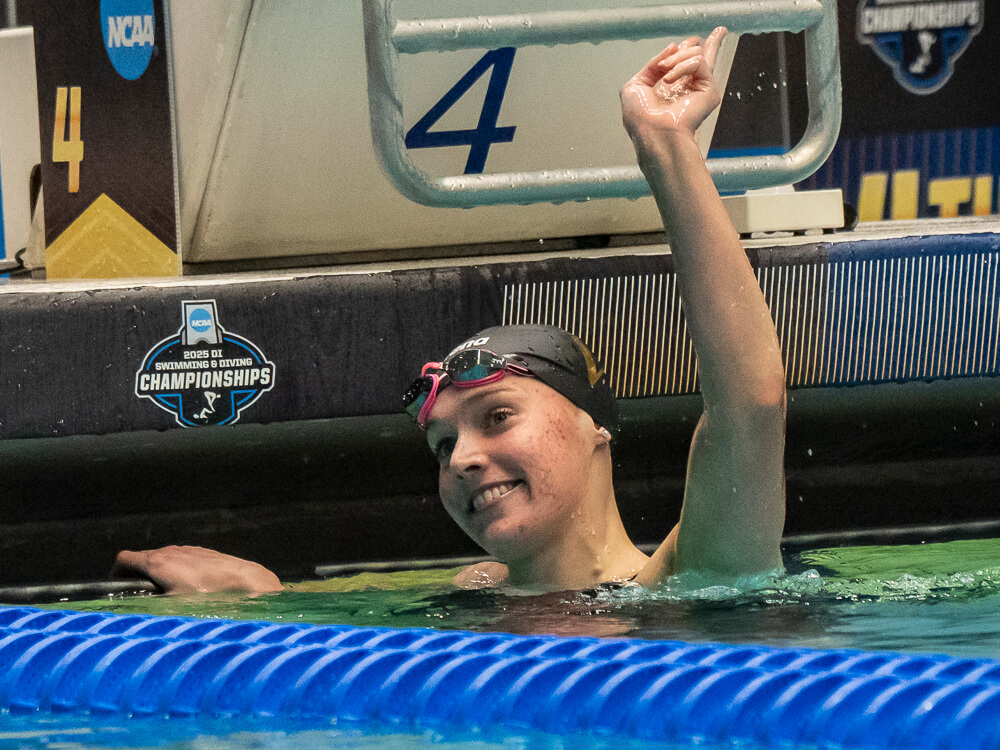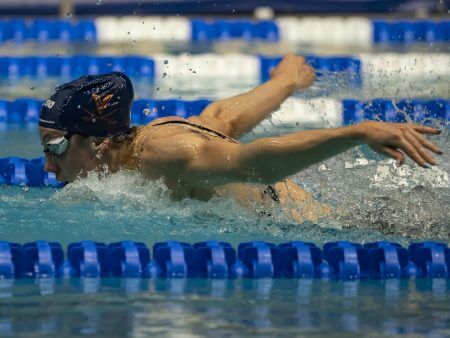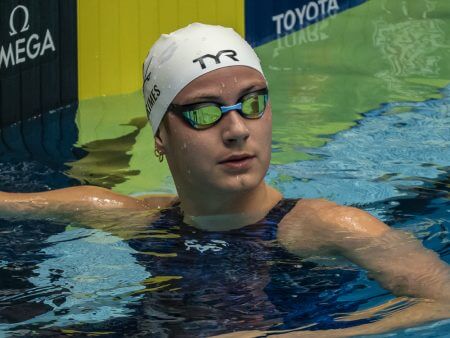Virginia Women Kick Off Post-Walsh Era With Loaded Roster Pursuing Another Title

Virginia Women Kick Off Post-Walsh Era With Loaded Roster Pursuing Another Title
On the way to a fifth consecutive national title last March, the University of Virginia women did not have to worry about maximizing every last point at the NCAA Championships. On the contrary, their win was a forgone conclusion all season as two of the sport’s most accomplished performers on the collegiate level, sisters Alex and Gretchen Walsh, were wrapping up their NCAA eligibility with a bang.

Gretchen Walsh — Photo Courtesy: Peter H. Bick
At the national meet, Gretchen ended up swimming the fastest time ever in all three of her individual events while Alex picked up a title in the 100 breaststroke, the fifth different individual race she won during her five years at UVA, along with two runnerup finishes. The sisters helped the Cavaliers dominate four relays, and the team’s margin of victory over Stanford was a whopping 127 points.
Now, head coach Todd DeSorbo tries to lead the team back to that championship peak without the aid of either Walsh sister. The team has history to overcome, as both previous teams to win consecutive titles (Texas from 1984 through 1989 and Stanford from 1992 through 1996) fell just short of No. 6. But Virginia, even without its longtime stars, enters the 2025-26 season in pole position to make history, with plenty of talented performers stepping into larger roles.
The role of top performer on the team now falls to Claire Curzan, in her third year with the Cavaliers program and second representing the college team. Last season, Curzan was part of all four national-title-winning relays while also scoring a pair of individual wins in the 100 backstroke and 200 backstroke, both in exceedingly tight finishes over Bella Sims. Curzan went on to qualify for the World Championships and win bronze in the 200-meter back in Singapore. While backstroke has developed into her best stroke, she will still handle a large freestyle load in the college season for relay purposes, and she could end up returning to butterfly as well.
Looking at Virginia’s relays from last season, Maxine Parker is also gone but Anna Moesch returns after making an immediate impact as a freshman a year ago. Individually, Moesch took fourth in the 100 free and fifth in the 200 free at the NCAA Championships, and she went on to reach the senior international level for the first time with her sixth-place finish in the 100-meter free at U.S. Nationals. Moesch picked up a silver medal for her relay efforts at Worlds.
Joining Virginia’s sprint efforts in Sara Curtis, an Italian sprinter who was a finalist in the 100 free and semifinalist in the 50 free at the World Championships. Relay teams combining Curzan, Moesch and Curtis will be clear favorites at the national level.
The team has typically not relied too heavily on international swimmers, but there will be three at the center of the Cavaliers’ efforts this year. In addition to Curtis, Aimee Canny (South Africa) returns following a semifinal appearance in the 200-meter free at Worlds while Lana Pudar (Bosnia and Herzegovina) joins the team having already won a European title and multiple global medals in the 200 fly.

Katie Grimes — Photo Courtesy: Peter H. Bick
Aside from Curzan, the most established star on Virginia’s roster is Katie Grimes, a two-time Olympian and the Paris silver medalist in the 400-meter IM. Grimes had a difficult initial adjustment to college swimming, with two fourth-place finishes her best efforts at the NCAA Championships, but her peak form would put her in the national-title hunt in the 500 free, 400 IM and 1650 free.
Virginia has four returning swimmers who won gold at the World University Games. Leah Hayes delivered the best performance of her already-accomplished career with a pair of individual medley wins. Tess Howley broke out in her trip to Germany as one of the world’s best 200 butterflyers while Emma Weber, an Olympian in 2024, shined with double gold medals in the sprint breaststroke events. Cavan Gormsen took steps forward in the middle distance races, using a stunning negative-split to win gold in the 200 free while adding silver over 400 meters.
Also back on the team this year are breaststroker Katie Christopherson and multi-event relay contributor Carly Novelline while the freshman class includes Madi Mintenko, already one of the United States’ best 200 freestylers following a productive junior-level international career. Mintenko was the sixth-fastest American in the 200 free in 2025 with her time of 1:56.95.
Yes, that’s still an absolutely loaded roster. No Walshes, no problem?
Looking at Virginia’s schedule over the next few months, we should expect the program to get to the ACC Championships unscathed. Sure, there are solid dual meets against Florida and NC State on the slate as well as the midseason CSCAA Dual Meet Challenge featuring Tennessee, but there are only two teams with the pieces to make a run at UVA. Stanford, led by Olympic champion Torri Huske, will await at the ACC Championships while Texas joins the party at the national meet in March.
The next few months will indicate whether this group can find enough points from its immense talent and depth to pull off another national win without a Walsh in sight. If the team’s returnees and new arrivals can swim to their potential, the Cavaliers’ dynasty might be the first to achieve the elusive six-peat.



